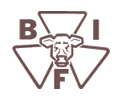Advancements in Genetic Prediction
Genomics Project in Growth Traits in Beef Cattle
Abstract:
This project, referred to as the Weight Trait Project (WTP), has been designed to address issues with creating and implementing DNA-based selection in conjunction with EPDs. DNA markers for birth weight, weaning weight and yearling weight have been identified through an association study of markers on the Illumina 50K assay with weight traits collected at the U.S. Meat Animal Research Center (USMARC). It is the intent then to reduce the number of markers used in application to a 384-single nucleotide polymorphisms (SNP) assay of the most informative SNPs.
Breed associations representing the seven breeds in the USMARC Cycle VII population have identified, for this project, seedstock producers in the region surrounding USMARC who will provide DNA samples on 1,000 animals per breed, 7,000 total, to include calves born in the 2009 calf crop and their dams. Igenity® has agreed to be the genetic service provider partner in this project and will genotype animals with the reduced panel. This population, as well as cattle from four university herds in the same region, will be used to validate MBVs computed from the effects estimated for those SNPs in the reduced panel.
Analysis for the validation will include investigation into the proportion of genetic variance accounted for in each trait by the MBVs from a bivariate analysis fitting the MBV as a correlated trait to phenotypes. If validated, new marker effects will be estimated using the information collected from the seedstock producers in conjunction with the data at USMARC. The new MBVs will be validated using the university herd records. To examine the impact of integration of MBVs into the calculations of EPDs, we will compute EPDs, for animals in the herds providing DNA, with or without integrating the MBVs into the evaluation system. Those results will be compared for improvement of accuracy in the evaluations of yearling bulls.
The WTP is a unified effort among researchers, breed associations, seedstock producers and a DNA testing company to improve the process of developing and validating DNA tests and to investigate the infrastructure necessary for the flow of the information needed for the delivery of Marker-Assisted EPDs.
Editor’s Note: The above material is provided by and posted with permission of the Beef Improvement Federation. Please direct reprint requests to BIF via the “Contact BIF” page at www.beefimprovement.org



